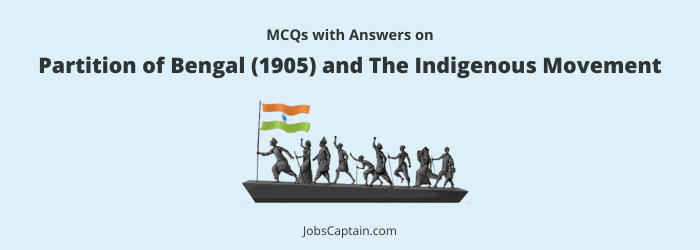
Question 1. In the context of the Indian Freedom Struggle, 16th October, 1905 is well known for which one of the following reasons?
(A) Lokmanya Tilak started Swadeshi Movement in Poona
(B)Dadabhai Naoroji declared that the goal of Indian National Congress was Swaraj
(C) Partition of Bengal came into effect
(D) The formal proclamation of Swadeshi Movement was made in Calcutta town hall
Question 2. Which movement started after the Partition of Bengal?
(A) Non-co-operation Movement
(B) Quit India Movement
(C) Swadeshi Movement
(D) Civil Disobedience
Question 3. Which of the following occurred last?
(A) Subsidiary Alliance
(B) Permanent Settlement
(C) Partition of Bengal
(D) Annexation Policy
Question 4. Anti-partition movement of Bengal was initiated on_________.
(A) 7th November, 1905
(B) 16th October, 1905
(C) 7th August, 1905
(D) 20th July, 1905
Question 5. Name the Viceroy of India concerned with Bengal partition.
(A) Lord Minto
(B) Lord Lytton
(C) Lord Curzon
(D) Lord Hardinge
Question 6. The Lieutenant Governor of Bengal at the time of Partition of Bengal was_________.
(A) A.T. Arundel
(B) Brodrick
(C) H.H. Risley
(D) Sir Andrew Fraser
Question 7. Who among of the following led the agitation against the partition of Bengal (1905)?
(A) Rabindra Nath Tagore
(B) Ashutosh Mukherjee
(C) C.R. Das
(D) Surendra Nath Banerjee
Question 8. Who among the following were the critics of Swadeshi movement and pleaded for a better understanding between the East and the West?
(A) B.G. Tilak
(B) R.N. Tagore
(C) S.N. Banerjee
(D) W.C. Banerjee
Question 9. Who was the first to suggest the boycott of British goods in Bengal?
(A) Satish Chandra Mukherjee
(B) Motilal Ghosh
(C) Krishna Kumar Mitra
(D) Aurobindo Ghosh
Question 10. Boycott of British goods was adopted as a national policy in_________.
(A) 1905
(B) 1903
(C) 1901
(D) 1899
Question 11. Partition of Bengal was done mainly for___________.
(A) For the development of Bengal
(B) To weaken the growth of Nationalism in Bengal
(C) For administrative convenience
(D) To divide the Hindu and Muslims
Question 12. The ‘Swadeshi’ and ‘Boycott’ were adopted as methods of struggle for the first times during the_______.
(A) visit of the Simon Commission to India
(B) Non-co-operation Movement
(C) Home Rule Movement
(D) agitation against the Partition of Bengal
Question 13. What was the immediate cause for the launch of the Swadeshi Movement?
(A) Death sentence pronounced on the Chapekar brothers
(B) The arrest and deportation of Lala Lajpat Rai and Ajit Singh; and passing of the Punjab Colonization Bill
(C) A sentence of 18 months rigorous imprisonment imposed on Lokmanya Tilak
(D) The partition of Bengal done by Lord Curzon
Question 14. Bengal was partitioned in 1905, but due to opposition it was again divided in________.
(A) 1909
(B) 1911
(C) 1916
(D) 1906
Question 15. In which year partition of Bengal made by Lord Curzon was cancelled?
(A) 1907
(B) 1906
(C) 1904
(D) 1911
Question 16. When was Bengal reunited due to the protests by Indians?
(A) 1971
(B) 1947
(C) 1911
(D) 1905
Question 17. The Partition of Bengal made by Lord Curzon in 1905 lasted untill_________.
(A) The Partition of India in 1947 when East Bengal became East Pakistan
(B) Gandhi launched his Civil Disobedience Movement
(C) King George V abrogated Curzon’s Act at the Royal Durbar in Delhi in 1911
(D) The First World War, when Indian troops were needed by the British and the partition, was ended
Question 18. Who was the leader of the Swadeshi Movement in Madras?
(A) Chintamani
(B) Chidambaram Pillai
(C) Rajagopalachari
(D) Srinivas Shastri
Question 19. Who among the following led the Swadeshi Movement at Delhi?
(A) Syed Haidar Raja
(B) Lajpat Rai
(C) Ajit Singh
(D) Bal Gangadhar Tilak
Question 20. Vande Mataram became the theme song of the Indian National Movement during __________.
(A) Non-Coperation Movement
(B) Anti-movement of Rowlett Act
(C) Champaran Movement
(D) Swadeshi Movement
Question 21. With reference to the period of extremist nationalist movement in India with its spirit of Swadeshi, which one of the following statements is not correct?
(A) Tagore preached the cult of Atmasakti, the main plank of which was social and economic regeneration of the villages
(B) The Bengal National College was founded in 1906 with Aurobindo as the Principle
(C) In 1889, the scheme of national education was formulated by Satish Chandra Mukherjee
(D) Liyakat Hussain led the Muslim peasants of Barisal in their agitations
Question 22. Which of the statement is not correct regarding ‘Swadeshi Movement’?
(A) It was limited to Bengal
(B) Neither this movement affected Bengal farmers and nor they were joined
(C) Women’s actively participated in this movement
(D) Some specific Muslims were joined in it
Question 23. The British journalist H.W. Nevinson was associated with_________.
(A) Quit India Movement
(B) Swadeshi Movement
(C) Civil Disobedience Movement
(D) Non-Co-operation Movement
Question 24. Who among the following had founded the ‘Indian Society of Oriental Art’ to revive ancient art traditions of India?
(A) Amrita Shergill
(B) Asit Kumar Haldar
(C) Nand Lal Bose
(D) Abanindranath Tagore
Question 25. The following programmes were launched by the nationalist against the partition of Bengal.
- Boycott
- Swadeshi
- Non-Co-operation
- National education
Select the correct answer
(A) 1, 2 and 4
(B) 1, 3 and 4
(C) 2, 3 and 4
(D) 1, 2 and 3
Question 26. Which of the following classes was mainly unaffected of Swadeshi Movement of 1905?
- Women
- Farmers
- Muslim
- Intellectuals
Select your answer of the following
(A) 1 and 3
(B) 2 and 3
(C) 1, 2 and 3
(D) 1 and 2
